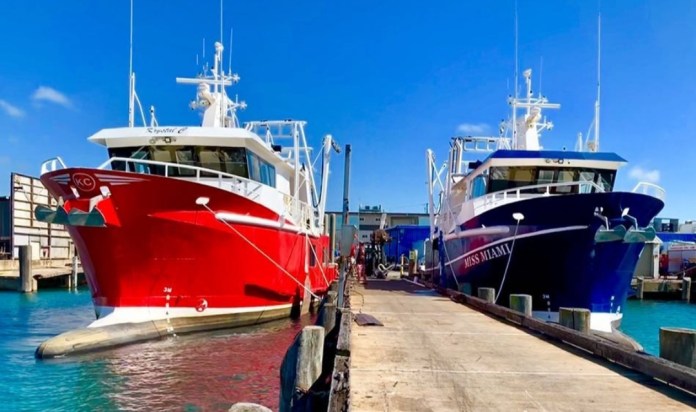
KUCHING, Oct 8: Malaysian shipyards including those in Sarawak are capable of building modern fishing vessels and trawlers that meet international standards, opines Sarawak Association of Marine Industries (SAMIN) president Dr Renco Yong King Hwa.
Strongly supporting a tighter Cabotage Policy favoring local shipyards, Yong disclosed that shipyards including its own members have been exporting fishing vessels to foreign clients in developed countries and have forged a reputation for building high quality, durable vessels at competitive costs.
Association of Marine Industries Malaysia (AMIM) recently called for the the government to introduce a ‘buy Malaysian fishing boats’ first policy.
AMIM was quoted in The Star on Oct 3, calling upon local fishermen to invest in modern fishing boats made from steel and composite materials built at local shipyards to take the fishing industry to another level.
“Our local shipyards are ready, willing and able to should it be introduced. This is in order to safeguard the interests of the local fishing industry and marine industry, especially shipyards. The need to modernize the fishing industry has become pressing with the growing local demand for fish, an important source of protein for Malaysians.
“It is crucial for the local fishing industry to upgrade from using unsafe, small wooden fishing vessels to bigger modern ones to meet increasing demand for fish and attain economies of scale which can eventually benefit consumers.
“Using new fishing vessels which are equipped with modern fishing gears and navigation equipment plus safety features will also boost the productivity and safety standards in the local fishing industry. This will certainly be beneficial to fishermen who can do their job more productively and with peace of mind knowing their boats are safe,” Yong said in a statement today.
In this regard, he called upon the government to the tighten implementation of the Cabotage Policy and to extend it to the shipbuilding and ship repair (SBS) industry to safeguard the interest of local shipyards and supporting players.
He also pointed out that the European Union and countries such as Australia and Indonesia have tightened their Cabotage Policy to protect the interests of local marine industry players, while United States being the strongest proponent of free market enterprise, imposes the policy strictly to protect the interest of its local marine industry players.
Yong added that Cabotage was exempted from the World Trade Organization (WTO) negotiations, hence it is well within the rights of any sovereign nation to impose it without having to worry about being reported to WTO for unfair protectionist policy.
As such, he believed Malaysia should not be tentative or apologetic for imposing tighter Cabotage Policy.
“Only a mere two per cent of the estimated 50,000 fishing vessels of all types and tonnage plying Malaysian waters involves in deep-sea fishing. Hence, there is tremendous upside potential for the local fishing industry to be modernized to enable fishermen to venture into deep seas fishing and improve their catch and income.
“However, this would only be possible with modern, large capacity and safe fishing vessels and trawlers capable of undertaking deep-sea fishing to bring home sizeable catch. Ageing wooden boats, which represents the majority of the current local fishing fleet, can only be used for coastal and inshore fishing”, he stressed.
Yong further explained that the marine industry is a backbone of the state’s maritime-dependent economy as shipping facilitates much of the transportation of local commodities and products to markets and the importation of cargos into the state.
“In this regard, the government must do all it can to continuously support the growth and development of the marine industry through providing incentives and favorable policies.
“This is crucial in helping industry players to survive these challenging times and grow to become competitive internationally to serve Malaysia’s trade and economic interests”, Yong said.
Meanwhile the Covid-19 pandemic has severely affected the business of SAMIN members in particular and the state’s marine industry players in general, owing to the movement restrictions and social distancing requirements imposed to curb the pandemic.
“Most of the shipyards in Sarawak have been facing with low order book, financial constraints due to the pandemic. This was partly due to the slum in the shipping sector and shard decrease in activities in the offshore oil and gas industry, which represents a major source of business for local shipyards.
“In addition to these, there is increased competition from shipyards in neighboring countries which have tightened their Cabotage Policy. Owing to the buy local vessels policy introduced in countries such as Australia and Indonesia, Malaysian shipyards have lost considerable business to their counterparts there which benefit from the policy.
“Most Malaysian shipyards are dependent upon local shipowners to commission new buildings and repair their ships at local yards. Without steady stream of business from local shipowners, their business has suffered significantly and some are barely surviving,” he laments.
As such, he believes the ‘buy Malaysian boats first’ policy would go a long way towards helping local shipyards and other marine industry players to survive these turbulent times and eventually grow from strength to strength to compete internationally. — DayakDaily








